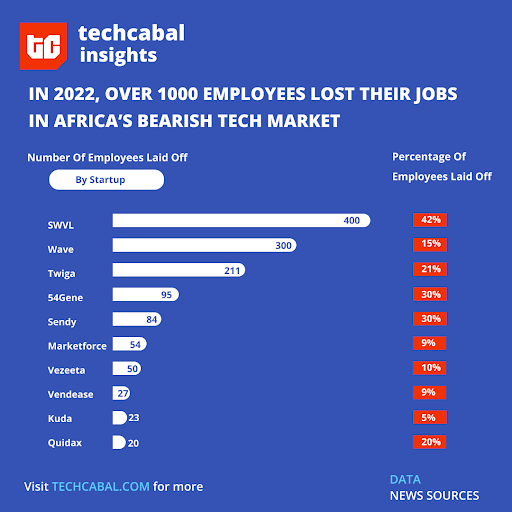
15 || 02 || 23
View in BrowserBrought to you by

#Issue 019
How to think abouttech layoffs
Greetings ET Readers 🖖🏾
Don’t panic; layoffs are standard in any business or sector. Even the most profitable companies in the world are forced to let go of highly-skilled workers when they need to make budgetary adjustments or transition into a new business phase.
Notwithstanding, getting laid off is not a pleasant experience and a lot of people struggle to find the motivation to search for a new job after getting laid off. In this edition of #EnteringTech🚀, our aim is to help you adjust your mental approach to job hunting amidst layoffss.
Here are a few things to keep in mind if you have been laid off:
- Do not beat yourself up if you were laid off due to economic and business challenges. You have no control over market fluctuations or rising inflation rates.
- New startups are launching almost every day. If you’ve worked in a startup long enough, you are likely to get a job in another one—or even a scale-up—that sees you as a good fit.
- Layoffs are common and will continue to happen for as long as businesses no longer need a continuous inflow of capital to thrive
- You are doing great.
Good luck!

by Koromone Koroye & Timi Odueso.

Tech trivia question
Some trivia before we begin. Answers are at the bottom of this newsletter.
- How many workers in tech have been laid off since The Great Layoffs began in 2022?
- Which tech company has laid off the highest number of employees?

The Great Layoffs
So you’ve heard tech companies are laying off employees 😔
Microsoft laid off 10,000 employees, Meta laid off 11,000, and Amazon laid off over 18,000 workers.
And it’s not only multinational bigwigs; even African tech companies are laying people off. Logistics startup Swvl laid off 400, fintech Wave laid off 300, and even telco Telkom recently announced that it is laying off over 1,500 people.

What’s more, these companies are instituting hiring freezes, which means they’ll employ a lot less people for the foreseeable future.
But should that stop you from entering tech? If tech companies aren’t hiring as much, should more people be developing their tech skills?
Over the past month, we’ve gotten questions like this in the “Ask a Techie” section, and because we like you guys a lot—and need you to read this newsletter so we can make money from it 🤑—we’ve got some answers in today’s edition.
We spoke to three HR professionals and recruiters to get, but right before we tell you what Faith, Emem, and Laetitia have to say, here’s why these layoffs are happening in the first place.

Why?
Here’s why the Great Layoffs are happening
We can generally classify the reasons for the layoffs into three broad categories, and don’t worry, we’ll keep them shorter than Elon Musk’s patience for Twitter employees.
1. Over-hiring during COVID: Believe it or not, the pandemic is still to blame for a lot of things, even though it technically ended two years ago. During COVID, internet usage and data consumption increased 283x. More people were using digital products and it meant the tech companies creating these products had to hire more people to build better products and improve their services. Now, everyone is back to doing things normally, and tech companies no longer need the thousands of workers they hired during the pandemic.
Since the economic downturn will mean fewer people are buying and using tech products, then companies will record less growth. Investors are used to growth but the economic downturn has brought stagnation. So many are urging companies they invest in to cut costs and prioritise profitability instead of growth. Even the rich cry too, especially when their money isn’t slaving as hard for them as it should be.

Don’t stop learning
But these layoffs shouldn’t stop you from becoming a techie!
So far, hundreds of thousands of tech workers have been laid off, but that shouldn’t stop you from entering tech.
Yes, you’re probably not No. 1 like Beyoncé is 🤷🏾♂️, but there’s definitely one or two companies out there that could benefit from your help.
To prove this, we spoke to three HR professionals across different sectors—including tech and traditional sectors.Emem Nkamare, Faith Emmanuel and Laetitia Mangala all agree that layoffs shouldn’t make you quit your budding tech career. Here’s why:
1. Layoffs aren’t new: If it’s not a recession, then it’s a company shutting down. Layoffs aren’t new, but people always manage to find new—and sometimes, better—jobs. Since the 1970s, the world has experienced several bouts of mass layoffs—and almost as many pandemics and sequel films of well-loved pop icon Godzilla. In the dot-com bubble burst of the early 2000s, over 2 million tech workers were laid off; and during the Great Recession—between 2008 and 2010—14 million jobs were lost! Within a few years, however, the economy reset itself and people found new jobs. Although, that’s not to say that everyone recovered, as many never did. The point here is that recessions and layoffs like this aren’t new, they happen almost as frequently as Cameroonian president Paul Biya is on seat: once a decade.
“People are building”, says Faith Emmanuel, head of talent at Big Cabal Media, “and there’ll be a boom soon that will require young tech talents.” Freelance tech recruiter Emem Nkamare, on the other hand, says that new startups will be more intentional with hiring. “I see new tech start-ups springing up all over the world with stronger intentionality and focus as a result of the layoffs, so there is still room for young Africans to get these opportunities eventually,” she says.
So there you have it. Layoffs are happening, and they may continue for a while but just like Sandra Bullock’s acting career or African presidents’ promises, they will someday stop.
You shouldn’t put a pause on developing your tech skills because of them; instead, think carefully about your next steps, and focus on careers and skills that will be critical to companies in the near future.
With these few points of mine, I hope I have been able to convince and not confuse you that there’s still hope for you to become a successful techie.
In exciting news from TechCabal🎉

To continue honouring our commitment to the startup ecosystem in Africa, TechCabal is launching “My Startup in 60 Seconds”, an exciting new video series where startup founders share the unique problems they’re solving for Africa in one short minute.
Six founders from South Africa and Nigeria tell us why they’re building @FamasiAfrica, @ThumezaHQ, @SycamoreNg, @KitovuT, OutWork Spaces and HealthStack Solutions.
Click this link to binge-watch the entire series in less than 6 minutes!
Here’s where to find your first tech job
If you’re interested in kicking off your career in tech, here’s a list of job boards that regularly upload their platform with African tech jobs.

Ask a techie
Q. Apart from the tech courses mentioned, which other tech courses would you recommend for a newbie who wants to change their career. It should be a short course that is in high demand, duration of the course and the salary range should be attractive.
Unfortunately, there’s none. There’s no shortcut to tech, it’s a misconception. Any high-income tech career will take years of practice and learning. If the learning stage were short and easy, we’d all do it and it wouldn’t be a career that’s high in demand anyway.
So if you’re looking to change your career, you’ll have to find time and effort. It’s a lot of hard work, but it’s worth it in the end.
That’s all we can take this week. Have any questions about working in tech? Ask away and we’ll find answers for you.👇🏾

Tech trivia answer

Opportunities
- Code for Africa is offering 4-6 month CivicTech fellowships for mid-career digital strategists, digital creators, technologists, data scientists and UX strategists/designers. Apply before February 19.
- The African Development Bank’s Fashionomics Africa is seeking African fashion, textile, apparel and accessories entrepreneurs and businesses. Apply by February 22.
- The Jasiri Talent Investor Programme is looking for highly driven individuals with a history of achievement and/or entrepreneurial action who aspire to launch a high-growth venture. Apply by April 23.
- The Catalyst Fund offers grants between $2,500–$15,000 to anyone anywhere in the world who has an early-stage idea or project that addresses pressing global challenges. Apply by February 28.
- The Climate Finance Accelerator is a global technical assistance programme funded by the UK government to directly support climate projects to access finance. Apply by February 17, 2023.
- The Growth Africa Accelerator Programme is calling for applications from ambitious and committed entrepreneurs from Kenya, Uganda, Ethiopia, Zambia or Ghana with the potential to grow and create impact through their businesses. Apply now.
- Applications are now open for the Nigeria Media Innovation Program’s (NAMIP’s) Sustainability Challenge. Winners will be awarded up to $50,000 for their project and join NAMIP’s innovation and capacity building programme that extends up till 2024. Apply by February 28.

Jobs
- TechCabal – Associate Editor, Senior Reporter, Reporter – Africa
- Zikoko – Managing Editor – Lagos, Nigeria (Remote possible)
- Big Cabal Media – Commercial Director, Head of Growth – Africa
- Big Cabal Media – Software Developer, Senior Product Manager, Sales Associate, Senior Sales Manager, Executive Assistant – Lagos, Nigeria (Hybrid)
- Brass – Sales Manager, Product Specialist, Brand Designer, Motion Designer, Product Designer, Business Operations Associate, Head of Business Banking – Lagos, Nigeria.
Disclaimer: TechCabal is not affiliated with or associated with jobs and opportunities listed on all its job boards and newsletters. All applicants bear the responsibility of researching about the roles and companies they apply to.

No longer want to receive these emails? Unsubscribe here

























